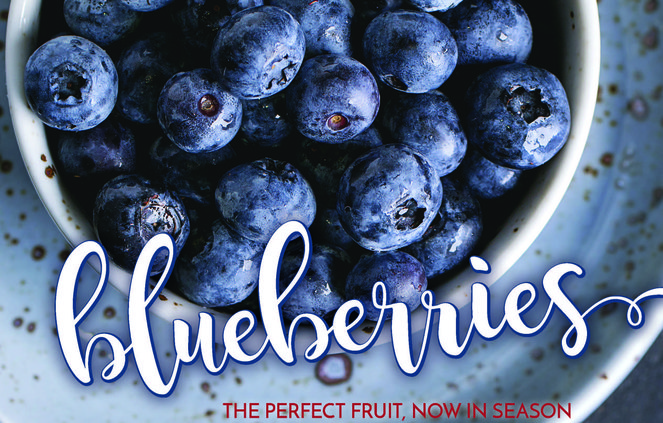Did you know that blueberries have surpassed peaches as the largest fruit crop in Georgia? That’s true, according to the Georgia Department of Agriculture. And it’s good news for fruit lovers who are seeing the perfect fruit that’s now in full season locally. “July is national blueberry month but that’s not the only reason to celebrate,” says Carin Booth, family and consumer science extension agent for Hall County. “Aside from being naturally low in calories and fat, blueberries are high in Vitamin C and fiber. They’re a great source of potassium and iron, plus they are high in antioxidants.
What’s not to appreciate about blueberries?” The plump, juicy and flavorful fruit is also versatile. Blueberries can be used in desserts, salads, main courses, as a compliment to meat dishes and eaten plain. They have about 80 calories a cup. “They’re also easy to freeze, and you can make jams, jellies and sauce with them, too,” she says. Local blueberries are plentiful at this time of year. “Even the berries you see in grocery stores are most likely grown in Georgia,” Carin says. “Just look on the label and you’ll see that most of them have the Georgia Grown logo and are from places in South Georgia like Alma, which is considered the blueberry capital of Georgia.”
South Georgia has the ideal climate and soil conditions for blueberries, but its easy to grow your own back yard berries here in Northeast Georgia. “Blueberries like acidic soil that’s well-drained,” says Nathan Eason, agricultural extension coordinator with White County. “The best approach is to find a sunny spot and then do a soil test to find out whether you need to add fertilizer or other elements specifically to grow blueberries successfully.”
The University of Georgia Extension local offices have soil test bags and instructions about how take soil samples. Then the office will send the bag to UGA to be analyzed. You’ll receive a detailed report about the condition of your soil. A general soil test costs between $6 and $8 and the results will be returned in a couple of weeks.
BLUEBERRY TIPS HERE ARE TIPS FOR STORING, EATING & COOKING WITH BLUEBERRIES. Select plump round dark-blue berries. Store them in the refrigerator without washing them. Rinse only the amount that you plan to use immediately, then let them drain on a paper towel. If you’re using blueberries in a batter recipe, coat them with flour before adding them, then stir carefully. This will keep them from sinking to the bottom of the batter.
To freeze, put unwashed berries in a single layer on a cookie sheet in the freezer. Once they’re frozen, place them in an airtight container or Zip-lock bag until you’re ready to use them. Frozen blueberries make a great snack straight out of the freezer. “Once you know how to prepare your planting site, select at least two varieties of plants so that they cross pollinate each other,” Nathan says. “You’ll get a better crop.
Rabbiteye blueberries are native to the Southeast, so they’re the best choice and they’re available in several varieties that can be easy to find.” Nathan suggests planting them in slightly mounded hills about 6 inches high. Then mulch them to prevent weeds and hold in moisture. “Blueberries require minimal ongoing care and pruning,” he says. “Feed them periodically with about a half cup of slow-release fertilizer, and keep the area clear of dead leaves to help prevent disease.
Apply fresh mulch each season, discarding last year’s mulch.” He also suggests occasional pruning to get rid of old canes, increase airflow and encourage new growth. This will also allow sunlight to more easily reach the inside branches and keep the plants low enough to making picking easy. “Growing blueberries can be rewarding and they are so easy to incorporate into your diet,” Nathan says. “And they’re good for you.”
Share your favorite blueberry recipes on facebook @HomeLivinginNorthGeorgia

